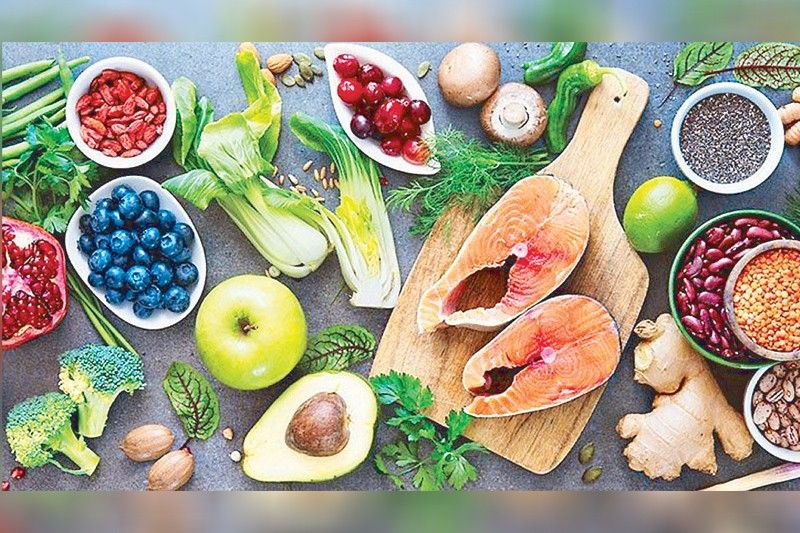What to eat to protect yourself against COVID-19


By this time, all of us must be cognizant of what COVID-19 is all about. It’s a viral infection that may lead to your immune system going into overdrive.
If a patient’s immune system is uncontrolled or unregulated, he might become overwhelmed by the infection. And the best way to control it would be to stop the dys-regulation before it leads to devastating events that can cost his life.
For high-risk patients with other comorbidities involved, there is no better prevention than toughening your defenses. Optimizing your nutritional status for a well-functioning immune system can be an important factor in protecting ourselves against viral infections. That is why nutritional recommendations for COVID-19 patients during quarantine are important to prevent further deterioration of one’s immune system and hospitalization, which can cost millions of pesos.
During infection, NLRP3 is a protein responsible for the activation of inflammatory responses. Therefore, inhibiting it can prevent inflammation, thus stopping the progression of the infection.
Mpro is an enzyme that allows virus replication and infection of new cells. It plays a role in prolonging the life cycle of this virus. Without Mpro, replication of the virus ends. Mpro is an attractive target for drug development against COVID-19 because of the enzyme’s essential role in the replication of the coronavirus and the absence of a similar enzyme in humans. Since people do not have the enzyme, drugs targeting this protein will less likely cause any side effects to humans while preventing the coronavirus from reproducing itself.
NF-KB is another protein that regulates inflammation, cellular growth and cell death.
If you can stop NLRP3, Mpro and NF-KB, you can probably prevent the progression of the viral infection into a more severe form. The moment you think you are infected, do the following steps:
• Load up on the proper food sources that will stop the process once you think you are already infected. Foods that will stop NLRP3 activation include quercetin in onions, berries, green tea, and apples; curcumin in yellow ginger; epigallocatechin in green tea, strawberries, cranberries, blackberries, kiwis, peaches, apples, avocados, pears, hazelnuts, pecans, pistachios; and resveratrol from grapes, peanuts and peanut butter, dark chocolates or cocoa, blueberries and cranberries.
Foods that will stop Mpro include luteolin in sweet green pepper, celery, pumpkin; naringenin in grapefruit (suha), orange, tomato, beans; apigenin in herbs (parsley, celery, rosemary, oregano, thyme, basil) and chamomile; oleuropein in olive oil.
Foods that will prevent NLRP3 and Mpro include okra, asparagus, arugula, watercress, and cilantro (wansoy).
Foods that will stop NF-KB are rich in vitamins such as vitamin A (sweet potato, carrot, tuna, squash, spinach, melon, lettuce, red bell pepper, broccoli); vitamin C (red/green bell pepper, orange, melon, orange, broccoli, strawberry); vitamin D (sardines/tuna, beef/chicken liver, egg yolk, shiitake mushrooms, dairy almond milk); glutathione (asparagus, avocado,bok choy/pechay, cucumber, green beans, mango, papaya, red pepper); melatonin (cherries, banana, oats, tomatoes, pineapples); and zinc (peas, chickpeas, squash, oats, garlic, salmon steak, dark chocolates, kidney beans, pumpkin seeds or any seed, shellfish).
• Load up on anti-inflammatory foods. One’s food choices are just as important as the medications and supplements you may be taking. Choose foods that can protect against inflammation. Your diet should include fresh vegetables and fruits, as well as reducing refined sugar intake. Eat food items that contain omega-3 fatty acids like salmon, tuna, tofu, walnuts, flax seeds and soybeans.
Other anti-inflammatory foods include grapes, celery, blueberries, garlic, olive oil, tea and some spices (ginger, rosemary and turmeric). The Mediterranean diet is a perfect example of an anti-inflammatory diet. This is due to its focus on fruits, vegetables, fish and whole grains, and limits on unhealthy fats, such as red meat, butter and egg yolks, as well as processed and refined sugars and carbs.
• Cut back on inflammatory foods. Inflammatory foods include red meat and anything with trans fats such as margarine, corn oil, deep-fried foods and most processed foods.
• Control your blood sugar.
• Exercise. Regular exercise is an excellent way to prevent inflammation. Make time for 30 to 45 minutes of aerobic exercise and 10 to 25 minutes of weight or resistance training at least four to five times per week.
• Try to lose weight. People who are overweight have more inflammation. Losing weight may decrease inflammation.
• Manage stress. Chronic stress contributes to inflammation. Engage in useful pursuits or activities that will make you happy like the arts (painting, creating cards, bookmarks, etc.), cooking, dressmaking, making accessories and many others, or do meditation, yoga, biofeedback, guided imagery, or some other method to manage stress throughout the day. We may not be able to change many of the stressful situations we encounter in life, but we can change our response and perception by learning to manage stress better.
It’s important to remember also that measures to reduce inflammation pay off over time with improved heath and reduced risk of chronic disease.
* * *
For inquiries, call 8401-84 11 or 0917-571-1992, 0999-883-4802 or email gc_beltran@yahoo.com. Follow me on Facebook @dragracebeltran.



















